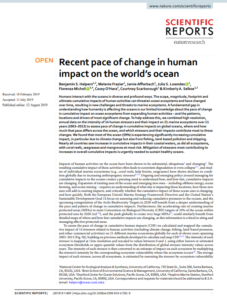Over the recent decade, the overall human impacts to the world’s oceans have, on average, almost doubled and could double again in the next decade without the necessary action, according to a new study by researchers from the National Center for Ecological Analysis and Synthesis (NCEAS) at UC Santa Barbara.
The study assessed for the first time where the combined impacts that humans are having on oceans are changing and how quickly. In about 60% of the ocean, the overall impacts are increasing significantly and, in many places, at a pace that appears to be accelerating.
That creates even more urgency to solve these problems
explains lead author Ben Halpern, director of NCEAS and a professor at UCSB’s Bren School for Environmental Science and Management.
Climate change is a key factor driving the increase across the world, as seas warm, acidify and rise. What is more, commercial fishing, runoff from land-based pollution, and shipping are intensifying progressively each year in many areas of the ocean.
This is a multifactor problem that the world must solve, adds Halpern.
[smlsubform prepend=”GET THE SAFETY4SEA IN YOUR INBOX!” showname=false emailtxt=”” emailholder=”Enter your email address” showsubmit=true submittxt=”Submit” jsthanks=false thankyou=”Thank you for subscribing to our mailing list”]
The study also projected the impacts one decade into the future, based on the rate of change in the recent past, concluding that they could double again if the pace of change continues unchecked.
The assessment provides a comprehensive perspective of where and how much human activities shape ocean change, which is essential to policy and planning.
Areas of special concern include Australia, Western Africa, the Eastern Caribbean islands and the Middle East, among others. Coastal habitats like mangroves, coral reefs and seagrasses are among the hardest-hit ecosystems.
There is a silver-lining to the story, however. The authors found “success stories” around every continent, regions where impacts have decreased, like the seas of South Korea, Japan, the United Kingdom and Denmark, all of which have seen significant reductions in commercial fishing and pollution.
These declines indicate that policies and other actions to improve ocean conditions are making a difference.
To assess the pace of change, the authors used two previous and similar assessments carried out by several of the same team members and others in 2008 and 2013, which provided first glimpses into the full, cumulative extent of humanity’s impacts on oceans.
Co-author Melanie Frazier, a data scientist at NCEAS was surprised to see in the data how dramatically ocean temperatures have increased in a relatively short period of time.
You don’t need fancy statistics to see how rapidly ocean temperature is changing and understand the magnitude of the problem. I think this study, along with many others, highlights the importance of a concerted global effort to control climate change































































